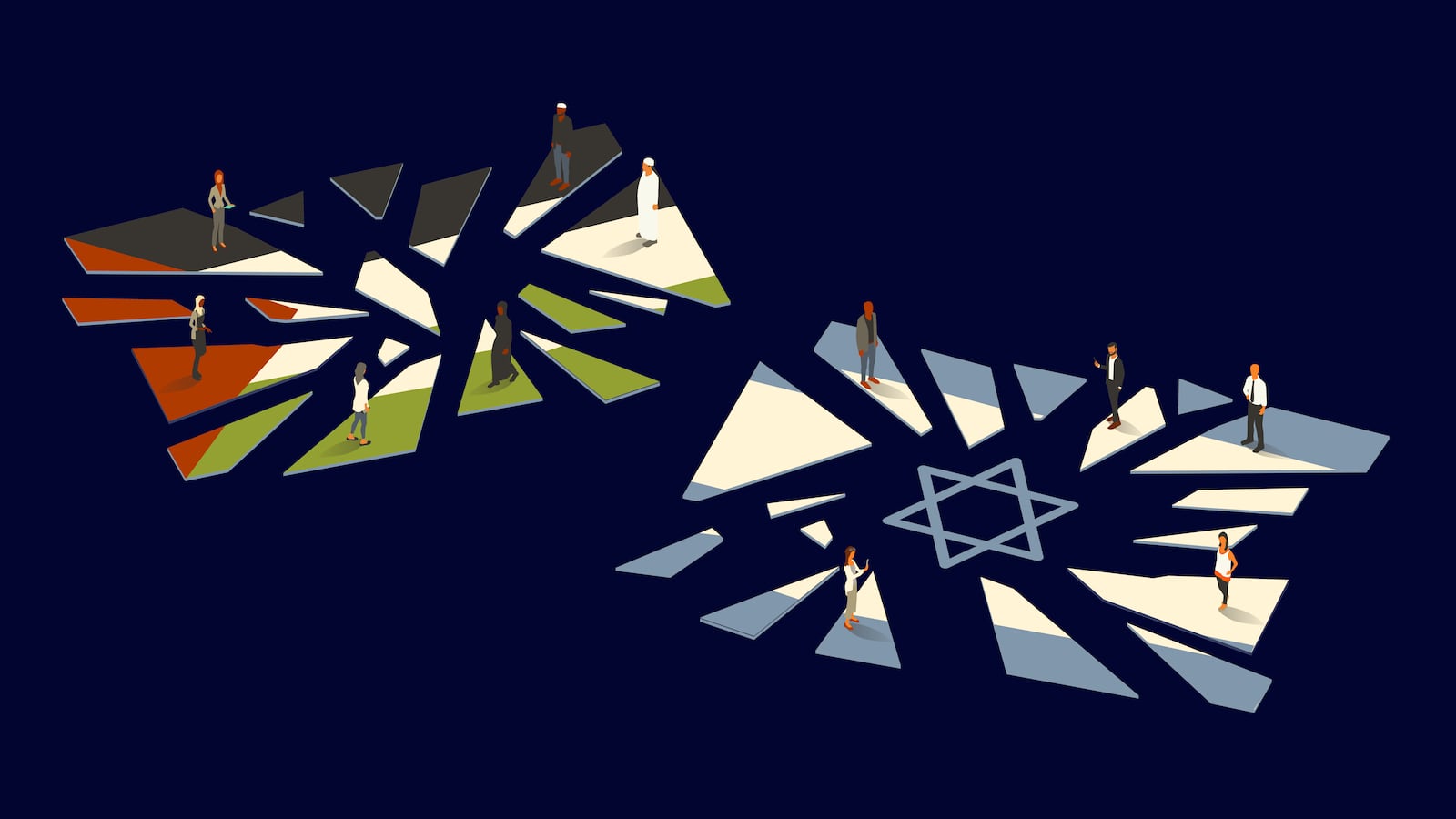Sign up for Chalkbeat New York’s free daily newsletter to get the latest news on NYC’s public schools.
In the past few years, social studies teachers have found it especially challenging to find unbiased, educational, and harm-free ways to cover myriad news events — from the COVID pandemic to George Floyd’s murder to the January 6 insurrection.
Such events often inspire passionate reactions depending on where they stand politically and ideologically. Add to the mix social media — with its real-time images, flashy infographics, and endless hot takes — and it is hard for almost anyone to process what is going on in a knowledgeable, thoughtful, and trauma-informed way.

Already finding it difficult to discuss these topics in the classroom, especially in states with curriculum and book bans, teachers now have a new current event with which to contend: the Israel-Hamas War. The conflict between Israelis and Palestinians has spanned more than three-quarters of a century, but the recent viciously violent flare-up has refocused attention on the region.
When the Hamas terrorist organization attacked Israel — murdering some 1,300 people and kidnapping hundreds of others — and when Israel declared war on Hamas, striking with incessant and deadly force in Gaza, home to 2 million Palestinians, about half of them children, I found myself grappling with how to discuss these tragic events with my students. I am sure teachers across the world were feeling the same way.
I teach AP U.S. History and U.S. History to high school juniors. We are currently in the pre-American Revolution era in both courses, so the topics of Israel and Palestine have yet to come up in class.
As a result, I decided to wait for an appropriate time to bring it up or just address it if a student inquired about it. The overall topic of Israel and Palestine already brings up a lot of emotions, often tied to people’s identity, so I wanted to address it in the best way possible.
I highly recommend the following resources to educators looking to teach the topic in their classrooms: War Grips Israel and Gaza After Surprise Attack from PBS NewsHour Classroom, Processing the Violence in Israel and Gaza from Facing History & Ourselves, The Israel-Hamas War: A Forum for Young People to React in The New York Times, How Do I Talk to My Kids About Violence? from Common Sense Media, and What Is U.S. Policy on the Israeli-Palestinian Crisis? from the Council on Foreign Relations. For more advanced students, this recent New York Times guest essay is interesting to read and analyze.
By the end of last week, I heard some students walking around asking peers if they were “Team Israeli” or “Team Palestinian.” And sure enough, a student posed that very question to me in front of the whole class.
As educators, our goal is to remain as unbiased as possible. We do this so our students feel safe and can draw conclusions after evaluating the facts, applying historical and critical thinking, and engaging with empathy.
When asked which “team” I was on, I explained that I was “Team Humanity.” I told them I thought the Hamas attacks on civilians in Israel were horrific. And I told them I thought Israel’s bombing campaign inside of Gaza was also horrific. Then, I emphasized that I was more curious about what they knew and thought.
I explained that I was ‘Team Humanity.’
Most of my students had taken Global History or AP World History class the year before, so they shared what they knew about the region — how both Jewish and Palestinian people ended up living there, the origins of the conflict, and what led up to this most recent tragic chapter in the two peoples’ fraught history.
Since I have a truly diverse population of students in my classroom, the teens shared multiple perspectives about what happened and how they felt about it. Some brought up the rise in present-day antisemitism. Others shared about what they see as 75 years of Israeli government abuse of the Palestinian people. Some students opened up about their fears of being Muslim since they heard from parents and others about the rise in Islamophobia that followed 9/11.
It was a tense conversation for me as a teacher who wants all my students to feel safe in class. With every raised hand, I was worried that a student would say something that might offend one of their peers. I did not want to replicate IRL what I was seeing online — adults in my feed fighting about Israel and Palestine, offending one another, and even losing friendships over it.
That did not happen in my class.
I did my best to ensure my students felt safe and heard. While that is what young people need right now, several of my students said this was the first time they had spoken formally in class about the topic all week. I understand why teachers are afraid to bring it up; I, too, was afraid.
However, I felt a tremendous relief and a sense of hope after the conversation. My biggest takeaway: Moments like this are why classrooms need to remain spaces where complex and sometimes controversial topics are discussed and where students feel comfortable sharing. That’s precisely why the laws intended to put a chill on discussing “divisive subjects” in school are doing a real disservice to young people and our nation.
If students do not learn how to have these discussions in a K-12 setting, then where will they attain this essential skill? We must teach young people how to engage empathically in civil discourse and to think critically about complicated topics. World events, like the tragedies we are now witnessing in the Middle East, are mostly out of our control. What we can control is how we respond to them. And education is one of the only reliable antidotes to all the hate and suffering.
Sari Beth Rosenberg has been teaching U.S. History and AP U.S. History at a New York City public high school for nearly 22 years. She co-hosts the PBS NewsHour Classroom Educator Zoom series and the Grifty Podcast. She often writes social studies curriculum and lessons for the New York City Department of Education. Rosenberg has been featured in The New York Times, The Washington Post, Reuters, CNN, NBC News, and many other outlets. She co-founded Teachers Unify Against Gun Violence and is a senior advisor for Voters of Tomorrow. You can follow her on Twitter, Threads, Instagram, TikTok, and Substack, where a version of this essay first appeared.

